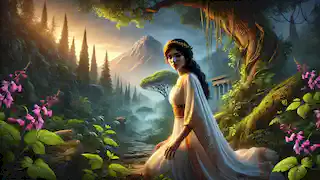In the heart of ancient Greece, where the gods mingled with mortals and the myths were woven into the very fabric of the land, there was a small village nestled in the shadow of Mount Parnassus. The villagers spoke in hushed tones of a hidden artifact, a relic said to hold unimaginable power—the Mirror of Truth. It was not a mere looking glass, but a mirror forged by the gods themselves, capable of revealing the deepest truths and exposing the darkest lies. The mirror had been lost to time, buried deep within the earth, waiting for the one worthy enough to wield it.
Aletheia, a young woman of striking beauty and unparalleled intellect, lived in this village. Her name, meaning “truth” in the ancient tongue, was a fitting moniker for one who abhorred falsehoods. From a young age, Aletheia was known for her unyielding honesty, a trait that endeared her to some and alienated others. Her father, a humble fisherman, often warned her of the dangers that such a trait could bring in a world where lies often masked survival.
But Aletheia was undeterred. She believed that the world was in desperate need of truth, especially in a time when deceit had become commonplace, even among the gods. The myths told of Zeus himself using lies to deceive his enemies, and of Hera's cunning trickery to achieve her ends. But Aletheia was determined to rise above the ways of the gods and mortals alike, to bring light where there was darkness, and to uncover the Mirror of Truth.
Her journey began on the eve of the summer solstice, a time when the veil between the mortal realm and the divine was thinnest. That night, as the village celebrated with feasts and dances, Aletheia stole away into the forest, guided by the whispers of the wind and the glimmers of moonlight. She knew that the path to the Mirror would be fraught with danger, but her resolve was unwavering.
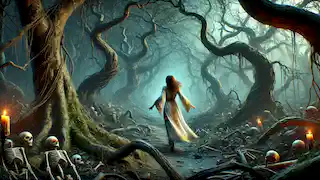
The first challenge she encountered was the Forest of Shadows, a place where the trees seemed to have a life of their own, their branches twisting and curling like the fingers of ancient sorcerers. The air was thick with the scent of moss and decay, and the ground was littered with the bones of those who had ventured into the forest, never to return. But Aletheia was not afraid. She had read the old scrolls, learned the ancient incantations, and she knew that only the pure of heart could pass through unscathed.
As she walked deeper into the forest, the shadows seemed to close in around her, whispering lies and half-truths into her ears. They spoke of betrayal, of love lost, of her father’s death in the village, and of the futility of her quest. But Aletheia’s heart was strong, and she brushed off their words like dust from her sandals. She spoke the incantation taught to her by the village oracle, a spell of clarity that dispelled the shadows and revealed the true path ahead.
At the heart of the forest, Aletheia found the first guardian of the Mirror—an ancient serpent, its scales glistening like emeralds in the dim light. The serpent was said to be as old as time itself, a creature born of the earth’s deepest caverns. It spoke in a voice that rumbled like thunder, “Why do you seek the Mirror, mortal? Do you not know that truth is a double-edged sword? It can heal, but it can also destroy.”
Aletheia looked into the serpent’s eyes, her voice steady as she replied, “I seek the truth not for power, but for the light it brings. I wish to cleanse the world of lies, to bring peace where there is strife.”
The serpent hissed, its tongue flickering like a flame. “Many have said the same, but they were consumed by the truth they sought. If you truly wish to find the Mirror, you must prove your worth. Answer this riddle, and you may pass. Fail, and you shall join the bones that lie beneath your feet.”
The serpent posed its riddle: “I speak without a mouth and hear without ears. I have no body, but I come alive with the wind. What am I?”
Aletheia’s mind raced as she considered the riddle. The answer was there, just out of reach, like a whisper on the wind. She closed her eyes, letting the sounds of the forest wash over her—the rustling leaves, the distant chirping of birds, and then it came to her. “An echo,” she said, her voice firm.
The serpent’s eyes glowed with approval. “You are wise, mortal. You may pass.”
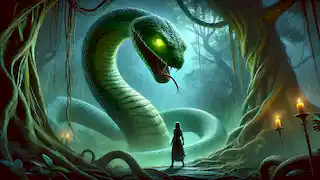
With the serpent’s blessing, Aletheia continued her journey, emerging from the Forest of Shadows into a valley bathed in golden light. It was here that she encountered the second guardian—a sphinx, its wings outstretched, its eyes burning with an inner fire. The sphinx was a creature of contradictions, a being that embodied both life and death, wisdom and folly.
The sphinx spoke without preamble, its voice a melodic cadence that echoed off the mountains. “I have guarded this valley for centuries, allowing none but the worthy to pass. To prove your worth, you must answer me this: What is greater than the gods, more evil than the Titans, the poor have it, the rich need it, and if you eat it, you die?”
Aletheia knew this riddle, for it was one that had puzzled even the greatest philosophers of Greece. She thought of the teachings of her ancestors, of the stories passed down through generations. She smiled, for the answer was simple, yet profound. “Nothing,” she said. “The answer is nothing.”
The sphinx nodded slowly, its expression unreadable. “You have answered wisely, but your journey is not yet over. The Mirror lies beyond the mountains, in a cave guarded by the spirits of those who have sought it before you. They will test your resolve, your heart, and your soul. Are you prepared to face them?”
Aletheia’s resolve did not waver. “I am.”
The sphinx stepped aside, allowing her to pass. The journey to the mountains was arduous, the path steep and treacherous, but Aletheia pressed on. As she climbed higher, the air grew thin, and the wind howled like a banshee. Yet, with each step, she felt the presence of the Mirror growing stronger, pulling her towards it.
Finally, she reached the entrance of the cave, a dark maw in the side of the mountain. The air around it was cold, as if the very breath of Hades emanated from within. Aletheia steeled herself and stepped inside, her footsteps echoing in the cavernous space.
Inside the cave, the air was thick with the scent of damp earth and something else—something ancient and powerful. The walls were lined with carvings of the gods, their eyes watching her every move. At the far end of the cave, in a pool of crystalline water, lay the Mirror of Truth.
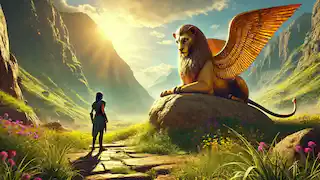
The Mirror was no ordinary mirror. It was a disk of polished silver, its surface so smooth and flawless that it seemed to glow with an inner light. As Aletheia approached, the surface of the Mirror rippled like water, reflecting not just her image, but the very essence of her soul.
But before she could reach out and touch it, the spirits of the cave appeared. They were shades of those who had sought the Mirror before her, their faces twisted in agony and regret. They whispered to her, their voices like the rustling of leaves, “Turn back, Aletheia. The truth will destroy you, as it did us. Leave while you still can.”
Aletheia’s heart pounded in her chest, but she refused to be swayed. “I have come too far to turn back now,” she said. “I will face whatever truth the Mirror reveals, no matter the cost.”
The spirits circled her, their whispers growing louder, more insistent. They showed her visions of her past, of the lies she had uncovered, and the pain they had caused. They showed her a future where the truth led to despair and destruction, where her loved ones turned against her, and where she was left alone, consumed by the very light she sought.
But Aletheia knew that these were only half-truths, twisted by the fears of those who had come before. She closed her eyes, steeling her resolve, and reached out to touch the Mirror.
The moment her fingers brushed the surface, a blinding light filled the cave. The spirits wailed and retreated, unable to withstand the purity of the Mirror’s power. Aletheia was engulfed in the light, her mind flooded with truths—some beautiful, others terrible. She saw the world as it truly was, every lie stripped away, every hidden motive laid bare.
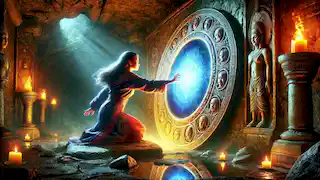
For what felt like an eternity, Aletheia stood there, absorbing the truth of the universe. It was overwhelming, almost too much to bear, but she held on, refusing to let the weight of it crush her. And then, just as suddenly as it began, the light faded, and she was left standing before the Mirror, her reflection staring back at her.
But it was not the same reflection she had seen before. The woman in the Mirror was older, wiser, her eyes filled with a knowledge that transcended mortal understanding. Aletheia knew then that she had been changed, transformed by the truth she had sought.
The Mirror
had granted her its power, but it had also shown her the cost of such knowledge. The truth was a burden, a responsibility that she would have to carry for the rest of her life. But it was a burden she was willing to bear, for the sake of the world.
With the Mirror in her possession, Aletheia returned to her village. The journey back was no less perilous than the one she had undertaken to find the Mirror, but she faced each challenge with a newfound strength and wisdom. The villagers greeted her with awe and reverence, for they could see that she had been touched by the divine.

In the years that followed, Aletheia used the power of the Mirror to bring truth to the world. She exposed the lies of tyrants, revealed the hidden intentions of the gods, and brought peace to those who had been torn apart by deceit. But she did so with care, knowing that not all truths were meant to be revealed, and that sometimes, ignorance was a mercy.
The Mirror of Truth became a legend, passed down through generations as a symbol of hope and justice. And Aletheia, the woman who had dared to seek it, became a myth in her own right—a beacon of light in a world often shrouded in darkness.
As time passed, Aletheia grew old, her once-raven hair turning silver with age. But even as her body weakened, her spirit remained strong, sustained by the truth she had uncovered. On her deathbed, surrounded by those she had helped and those who loved her, Aletheia held the Mirror one last time.
She saw herself as she truly was—not just a mortal woman, but a being who had touched the divine. And as she breathed her last, the Mirror shattered into a thousand pieces, each shard carrying a fragment of the truth she had uncovered. The shards were scattered across the world, hidden in places where only the worthy could find them.
And so, the legend of Aletheia and the Mirror of Truth lived on, a story of courage, wisdom, and the eternal quest for the light in a world of shadows.
